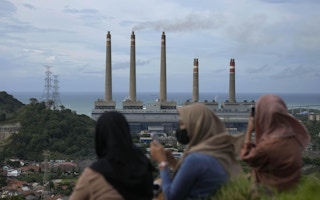A US$20-billion deal to help Indonesia reduce its dependence on coal to power its economy has been rocked by the withdrawal of the United States as a contributing partner.
To continue reading, subscribe to Eco‑Business.
There's something for everyone. We offer a range of subscription plans.
- Access our stories and receive our Insights Weekly newsletter with the free EB Member plan.
- Unlock unlimited access to our content and archive with EB Circle.
- Publish your content with EB Premium.
The US’s involvement in the landmark Just Energy Transition Partnership (JETP) – a climate funding deal between rich countries and the Global South – had been on shaky ground when it withdrew from its role as co-leader of the pact last month.
An executive order from the Trump administration earlier in January said the US had previously joined initiatives that “do not reflect our country’s values or our countributions to the pursuit of economic and environmental objectives” rubber-stamped America’s exit.
On Thursday, the US Treasury Department confirmed the US withdrawal, in response to media enquiries.
Indonesia’s JETP secretariat head Paul Butarbutar told Eco-Business that the other funding partners, which include France, Germany, Britain, Canada and the European Union as well as private donors, would continue to support the pact.
America’s commitment to Indonesia’s JETP deal amounts to US$2 billion. This includes a US$1-billion guarantee to the World Bank for Indonesia to borrow for energy transition projects and a US$1-billion investment made by the US International Development Finance Corporation (DFC).
“
The US exit from the JETP sets a dangerous precedent and signals to the rest of the world that the US will no longer be accountable to its climate obligations.
Norly Mercado, Asia regional director, 350.org
Butarbutar noted that the guarantee was signed by the US last year, and has not been impacted by the executive order “so far”. Investments made through DFC will be made “inline with the bank’s mission”, and will not be impacted by the executive order too, he said.
However, the US withdrawal is likely to affect transition studies and the issuance of grants, news agency AFP has reported.
At the same time as the US withdrew from the Indonesia JETP deal, it also pulled out of similar climate finance pacts with Vietnam and South Africa, also coal-rich countries struggling to transition to clean energy.
On Tuesday, US Treasury Department officials also informed Jean-Christophe Donnellier, the developed country co-chair for the global loss and damage fund, that the nation will withdraw from the fund board, according to a letter seen by Eco-Business.
The fund, signed off at the COP29 summit in Baku, Azerbaijan last year, provides assistance to nations most severely impacted by the effects of climate change.
Activist Harjeet Singh, who is founding director of Satat Sampada Climate Foundation, said the decision not only “exemplifies a longstanding pattern of obstruction by the US government in securing necessary finance for addressing climate impacts”, but it also undermines global efforts to deliver climate justice.
“While their absence might keep the ambition of the fund from being diluted, it does not absolve the US of its responsibilities, he said, adding that the US bears a significant share of the blame for climate adversities affecting vulnerable populations.
“We must hold it accountable and ensure it contributes its fair share towards global climate reparations,” he said.
Norly Mercado, Asia regional director of non-profit 350.org, commented that developing countries like Indonesia and Vietnam should not use America’s retreat from climate action as “an excuse” to delay their own commitments to phase out coal and accelerate the shift to cleaner renewable energy sources.
“Money exists to fund Asia’s clean energy future – but it is concentrated in the hands of billionaires and big polluters. Now more than ever, governments must demonstrate leadership and cooperation in solving the climate crisis by redirecting billionaire wealth to community-led renewable energy,” she said. Civil society and activists tracking the energy transition have been ramping up calls for polluters to be taxed and held accountable in recent years.
News of America’s latest retreat from climate action comes a month after Indonesia’s climate and energy envoy Hashim Djojohadikusumo called JETP a failure.
“Not one dollar has been disbursed by the American government,” Hashim said at a sustainability conference in Jakarta in February. “The US government has made a lot of promises, like a US$5 billion grant as part of the US$20-billion JETP. But it turns out the grant doesn’t actually exist.”
Hashim had said that there is a clause in the JETP stating that the US$5 billion will only be granted if funds are available. He also decried the Paris Agreement as “no longer relevant” for Indonesia, after the US pulled out of the historic climate pact soon after Donald Trump’s return to the White House.
According to analysis by Indonesian think tank the Institute for Essential Services Reform, some funds have been made available to Indonesia through JETP, including US$230 million in grants and technical assistance.










